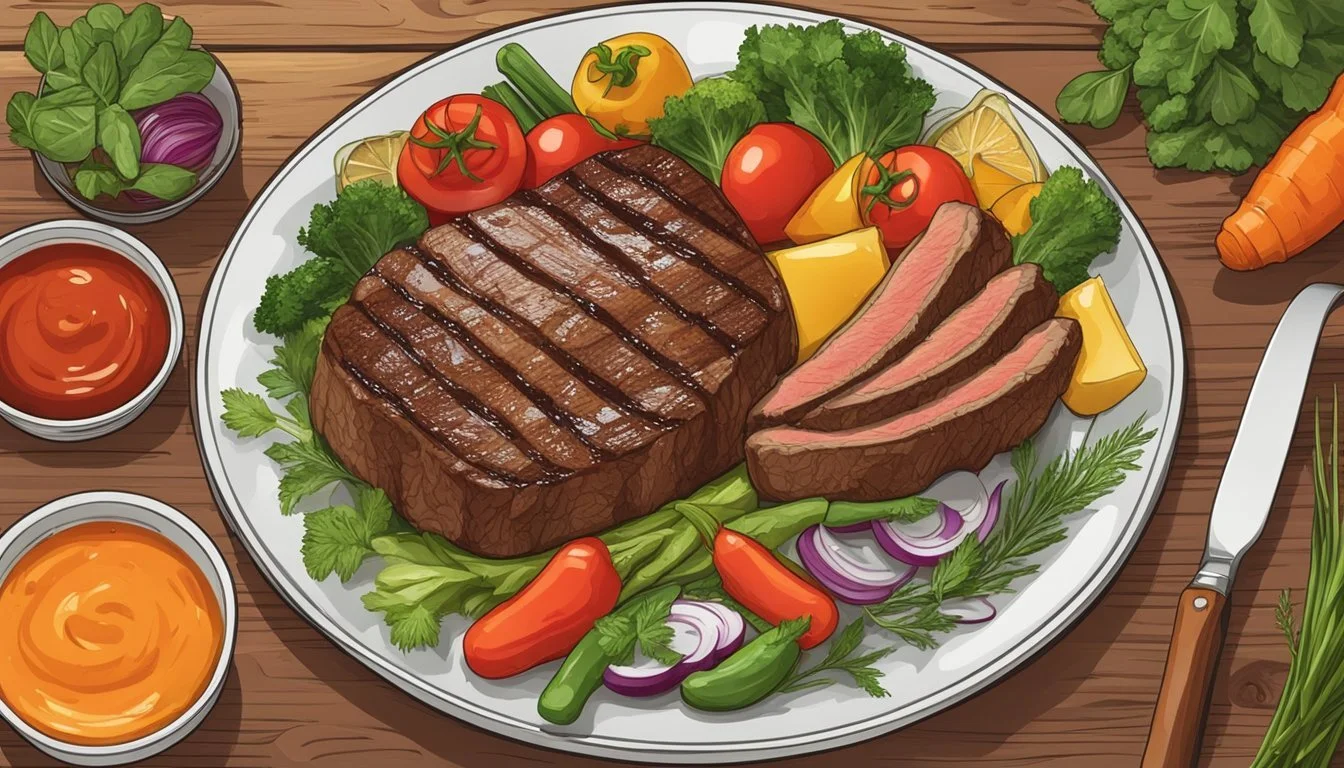Can You Eat Hot Sauce on a Carnivore Diet?
Understanding the Dos and Don'ts
The carnivore diet, a regimen centered around the consumption of animal products and the elimination of plant-based foods, has gained traction among individuals seeking health benefits through a more ancestral eating pattern. Enthusiasts of this diet focus on consuming meat, fish, eggs, and certain dairy products while avoiding fruits, vegetables, grains, nuts, and seeds. Within this framework, questions often arise regarding the inclusion of specific food items, particularly condiments like hot sauce that are traditionally derived from plants.
Hot sauce, consisting primarily of chili peppers, vinegar, and spices, presents a unique case for those adhering to the carnivore diet. Although it originates from plant-based ingredients—which are generally excluded from the diet—the minimal quantities in which it is used mainly as a flavor enhancer may lead some to consider its inclusion. The decision to incorporate hot sauce into the carnivore diet depends on one's interpretation of the diet's restrictions and personal health goals. It is essential to scrutinize the hot sauce labels for additional ingredients, as some may contain sugars, preservatives, and other additives that could contradict the diet's principles.
Carnivore Diet Basics
In this section, the reader will grasp the core concepts of the carnivore diet, its reliance on animal products for nutrition, and the typical foods involved.
Definition and Principles
The carnivore diet is characterized by consumption solely of animal products and the exclusion of plant-based foods. It operates on the principle that a meat-centric nutrition plan simplifies eating and focuses on foods high in protein and animal fats, targeting intake of essential nutrients found predominantly in meats.
Benefits of Meat-Centric Nutrition
Individuals who follow this diet report benefits such as weight loss and improved digestion, which they attribute to the high intake of meat, fish, and eggs, all rich in essential nutrients. The diet emphasizes eating foods in their whole form to maximize nutrient absorption.
Common Foods Consumed
The common foods consumed on a carnivore diet include:
Meat: Beef, pork, lamb, game
Fish: Salmon, mackerel, sardines
Eggs: Chicken, duck, quail
Dairy products: (for some variations of the diet) Cheese, butter
Animal fats: Tallow, lard
These items are considered cornerstones of the diet, providing the necessary fat and protein for daily energy and bodily functions.
Make your life easier by ordering tallow or lard online; it's just a few clicks away!
Understanding Hot Sauce
Hot sauce is a commonly used condiment with a diverse range of blends and flavors. Its ingredients, health effects, and culinary roles are varied, to which we'll explore with specificity.
Ingredients in Hot Sauce
Most hot sauces contain three primary ingredients: peppers, vinegar, and salt. The type of pepper used, such as chili peppers, directly influences the spiciness level and flavor due to the compound capsaicin. For instance, Tabasco sauce includes tabasco peppers, distilled vinegar, and salt. Cholula hot sauce incorporates arbol and piquin peppers along with salt, vinegar, and other spices. Additional seasonings or spices may also be present to create unique tastes and complexities.
Health Implications of Consuming Hot Sauce
The consumption of hot sauce can affect individuals differently. Capsaicin, the active component that provides the heat in chili peppers, has been associated with various health benefits such as aiding digestion and providing antioxidants. However, it can also provoke acid reflux in some individuals. Moreover, hot sauces can include sugars and preservatives, which consumers might need to consider based on dietary restrictions or health goals.
Culinary Roles of Hot Sauce
Hot sauce mainly serves to enhance and complement flavors in various dishes. It's versatile and can be applied sparingly or liberally depending on personal heat tolerance and flavor preference. The culinary use of hot sauce extends from a simple dash in a marinade to a vigorous addition in sauces and dressings. It imbues a distinctive zest that is characteristic of both traditional and innovative cuisines.
Hot Sauce on Carnivore Diet
The Carnivore Diet primarily consists of animal products and excludes plant-based foods. Hot sauce, typically being a plant-derived condiment, raises questions about its compatibility with the diet. This section addresses whether hot sauce aligns with carnivorous eating principles and guides on selecting appropriate hot sauce varieties.
Compatibility with Carnivore Principles
On a strict carnivore diet, individuals consume exclusively animal-based products, minimizing plant-based ingredients. Consequently, most hot sauces, made from plants like cayenne peppers, do not align with the diet's stringent exclusion of plant matter. However, some adherents may permit small amounts of plant-derived seasonings for flavor enhancement. A strict approach would necessitate the omission of hot sauces containing sugar, additives, or preservatives, focusing on those with minimal ingredients.
Selection Criteria for Hot Sauces
When selecting a hot sauce suitable for a carnivore diet, one should consider the following criteria:
Ingredients: Opt for hot sauces with minimal and recognizable ingredients.
Sugar-Free: Ensure the sauce contains no added sugars or sweeteners.
Additives and Preservatives: Choose options free from artificial additives and preservatives.
Minimal Plant-Based Ingredients: While difficult to adhere to on a carnivore diet, if one chooses to incorporate hot sauce, select those with lesser amounts of plant-based components.
For example, Tabasco sauce, known for its simple composition, typically includes only cayenne peppers, vinegar, and salt. However, for the strictest adherence to carnivore principles, one should avoid hot sauces altogether or prepare a homemade version using animal-based or approved minimal ingredients.
Health Considerations
Evaluating the health implications of adding hot sauce to a carnivore diet necessitates understanding both the potential benefits and risks associated with its consumption, as well as the importance of serving sizes.
Benefits and Risks for Carnivore Dieters
Potential Benefits:
Metabolism: Capsaicin, the active component in chili peppers found in hot sauce, may boost metabolism.
Pain Relief: Some believe capsaicin has pain-relieving properties.
Anti-inflammatory: Capsaicin might help reduce inflammation.
Potential Risks:
Irritation and Heartburn: Individuals may experience irritation or heartburn due to hot sauce's acidity and spiciness.
Digestive Issues: For those with sensitive digestive systems, hot sauces might trigger or exacerbate certain digestive issues.
Managing Moderation and Serving Sizes
Moderation: A carnivore diet restricts plant-derived foods, while hot sauce typically contains plant ingredients. Thus, hot sauce should be used sparingly.
Serving Sizes:
Weight Influence: Overconsumption could negatively impact weight goals.
Nutritional Imbalance: Excessive use may lead to overshadowing the nutrition obtained from animal products.
Using hot sauce in minimal amounts may mitigate any health issues while allowing dieters to enjoy the flavor enhancement it provides.
Culinary Aspects of Hot Sauce in Carnivore Cooking
Many carnivore diet adherents find that incorporating certain condiments into their diet can enhance the flavor of their meals without breaking the strict rules of their dietary choices. Below is a detailed examination of how hot sauce can be utilized in carnivore diet recipes and what alternative seasonings and condiments can be used in its place.
Incorporating Hot Sauce in Recipes
Carnivore diet followers often rely on heat to sear meats such as steak and seafood to perfection, creating a flavorful crust. In this context, hot sauce can serve as a condiment that complements the natural taste of these proteins without overpowering them. With the right hot sauce, one that contains only animal-based ingredients or simple plant derivatives like vinegar and salt, culinary enthusiasts can safely introduce it into their recipes.
Here are key points on using hot sauce:
Bacon: A dash of hot sauce can add a spicy twist to crispy bacon.
Steak: For those who enjoy a hint of spice, hot sauce can be lightly drizzled over seared steak.
Seafood: Seafood often pairs well with acidic flavors, making a compatible hot sauce a good match.
Organs: Organ meats, which are nutrient-dense, can gain an improved palatability with a careful amount of hot sauce.
One should be vigilant about the ingredients in the hot sauce, ensuring there are no added sugars or fillers that would be non-compliant with the carnivore diet.
Alternative Seasonings and Condiments
While hot sauce is often permissible on the carnivore diet, some remain purists and opt for alternative seasonings and condiments that are more traditionally animal-sourced. These include but are not limited to:
Butter: Unsalted butter can be used generously to add a rich, creamy flavor to all types of meats.
Mayonnaise: Homemade mayonnaise, made from egg yolks and animal fats, serves as a creamy condiment for those on the carnivore diet.
Seasoning: Simple seasonings such as salt are always acceptable and enhance the natural flavors of meat.
BBQ sauce: Most commercial BBQ sauces are not carnivore-friendly due to added sugar and plant-based ingredients.
Mustard: While mustard is plant-based, many carnivore dieters allow it in small quantities due to its minimal carbohydrate content.
When seasoning meats or searching for appropriate condiments, those on the carnivore diet should always prioritize ingredients that align with their dietary guidelines.
Avoid the crowds and shop for salt and mustard online from the comfort of your home!
Impact on Long-Term Adherence to the Carnivore Diet
When considering the addition of hot sauce to a carnivore diet, it is crucial to assess how this choice may influence one's ability to maintain the diet long-term. Factors such as satiety, food enjoyment, and the strictness of the dietary approach play significant roles.
Likely Effects on Satiety and Food Enjoyment
Adding hot sauce to meals on the carnivore diet may enhance food enjoyment for individuals by providing variety in flavor without significant carbohydrate intake. Personal choice plays a pivotal role here; some may find that hot sauce increases the palatability of their meals, which can support consistent adherence to the diet. However, it's important to choose sauces that do not contain sugars or plant-based additives, adhering to the principles of a strict carnivore diet.
Potential Challenges and Solutions
Integrating hot sauce into a carnivore diet may pose challenges for those practicing this lifestyle for weight loss or as an elimination diet. The inclusion of hot sauces, especially those with added sugars or artificial ingredients, can potentially lead to unintended deviations from the strict elimination framework. To mitigate this, individuals can:
Check labels: Look for hot sauces with zero-carb content and no non-animal additives.
Moderation: Use hot sauce sparingly to avoid disrupting the diet's benefits.
By addressing these challenges, individuals are more likely to lose weight effectively and sustain the diet as a long-term lifestyle choice. Adhering to a strict carnivore diet requires careful consideration of any additions to the diet and finding a balance that supports personal goals and dietary satisfaction.
Nutritional Content and Dietary Implications
When incorporating hot sauce into a carnivore diet, one must consider its macro and micronutrient content, specifically evaluating calories, carbohydrates, and any added sugars that could stray from the diet's tenets.
Analyzing Macros and Micros in Hot Sauces
Calories: Hot sauces typically contain a negligible amount of calories, with an average ranging from zero to five calories per teaspoon, making them a low-calorie option for flavoring meals.
Carbohydrates: The carbohydrate content in hot sauce is usually minimal. However, carbohydrates can vary depending on the ingredients used. Added sugar, if present, can increase carbohydrate content.
Nutrients: Although not a significant source of nutrients, some hot sauces may offer trace amounts of vitamins and minerals, primarily from chili peppers which contain vitamin C and capsaicin, the compound responsible for the heat, which has antioxidant properties.
Avoiding High-Carb and Sugary Variants
It's crucial for individuals on the carnivore diet to scrutinize labels for added sugars or sweeteners that can elevate carbohydrate levels. Opt for hot sauces with:
Low net carbohydrates
Simple ingredient lists
When evaluating hot sauces, look for varieties that prioritize:
Peppers
Vinegar
Salt
Avoid versions with ingredients like:
Fruit purees
Artificial preservatives
Flavor enhancers high in carbs
Careful consideration of these factors ensures compliance with the carnivore diet's rigorous standards.
Consumer Guidance
When integrating hot sauce into a carnivore diet, consumers must pay close attention to product labels to ensure compatibility. It is crucial to understand individual food sensitivities and select sauces that align with the carnivore protocol.
Reading Labels for Optimal Selection
Consumers should scrutinize the ingredients list of any hot sauce with vigilance. The ideal product would be sugar-free and free from artificial flavors, vegetable oils, and unnecessary preservatives. It’s important to look for simple formulations that typically include peppers, vinegar, and salt. Checking the label for hidden sources of sugars and non-carnivore friendly additives is a key step in selection. The use of tables could assist in illustrating suitable versus unsuitable ingredients, as follows:
Suitable Ingredients:
Peppers (non-nightshade if sensitive)
Vinegar
Sea salt
Unsuitable Ingredients:
Sugars (incl. high fructose corn syrup)
Artificial flavors
Vegetable oils
Preservatives
Understanding Food Sensitivities
Not all individuals respond to food items similarly; thus, being aware of one's sensitivity to nightshades, which include most peppers, is necessary. They should seek hot sauces that avoid these if they have known reactions. For those sensitive to higher acidity, selecting a hot sauce with a milder vinegar content or using it sparingly may be beneficial. Remaining attentive to the body’s response after the introduction of hot sauce can guide future dietary choices within the carnivore diet framework.
FAQs and Common Concerns
This section addresses frequently asked questions and common misconceptions regarding the inclusion of hot sauce in a carnivore diet, ensuring readers are well-informed on the topic.
Addressing Frequently Asked Questions
Can hot sauce be included in a carnivore diet?
While a carnivore diet primarily consists of animal products, some individuals may include minimal quantities of hot sauce. This condiment is typically low in carbohydrates, which aligns with the low-carb nature of the diet and is unlikely to disrupt ketosis if consumed in small amounts.
Will hot sauce affect my metabolism on a carnivore diet?
Most hot sauces contain minimal ingredients that should not significantly impact metabolism. The diet itself is known for possibly increasing metabolism due to its high protein content.
Is there a risk of digestive discomfort from hot sauce on a carnivore diet?
Some individuals may experience digestive discomfort from the acidity in hot sauces. If such discomfort occurs, it's advised to limit or avoid hot sauce consumption.
Does hot sauce contain any non-carnivore diet-approved ingredients?
Strict adherence to the carnivore diet would disallow plant-based foods, including legumes, grains, fruits, and most vegetables. Some hot sauces may contain spices derived from plants, but many carnivore diet followers may choose hot sauces with the fewest plant-based ingredients.
Misconceptions and Clarifications
Misconception: All hot sauces are off-limits on a carnivore diet.
Clarification: While pure carnivore guidelines exclude plant-based foods, some individuals allow exceptions for small quantities of certain condiments, such as hot sauces which are low in carbs and sugars.
Misconception: Including hot sauce can lead to failure in maintaining a carnivore diet.
Clarification: It's crucial to understand that the carnivore diet focuses on animal products, and while hot sauce is derived from plants, it is often consumed in such minimal amounts that it does not constitute a significant deviation for most followers.
In reviewing these points, one should consider their personal goals and dietary responses to determine the suitability of including hot sauce in their carnivore diet.










